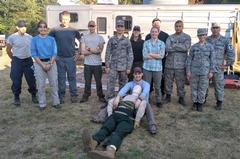Staff Sections
Main Content
NC Wing Hosts Land Search Field Team Member Course
Cadets excel at NC-8100 training held in Burlington
7/27/2019–BURLINGTON, NC–Three cadets and two Senior Members represented the North Carolina Wing of Civil Air Patrol (CAP) at a week-long Land Search Field Team course in Burlington, North Carolina on 15-20 July 2019. Conducted by Pineland Resources, Inc., the NC-8100 course covered an extensive array of topics including land navigation, wilderness survival, sign cutting, and land search techniques. The training culminated in a full mission profile search for a missing person.
In addition to CAP members, the class of 15 included firefighters, medics, and other first responders who began their instruction in the classroom where instructors Charlie Williams, Andy Osbourne, and Capt Ben Watkins shared their extensive training and knowledge to prepare the students for a series of tests and hands-on practical exercises out in the field. Charlie Williams, a retired U.S. Army Green Beret, Andy Osborne, a retired Captain from Charlotte Fire Rescue, and Capt Ben Watkins, the CAP Section Manager of NC Emergency Management, used their vast real world experience in the field of survival, land navigation, and search and rescue to enhance the classes with a level of wisdom and credibility seldom found.
After confirming that each student had the required gear needed for the course, the training transitioned to a field environment where the students got the opportunity to put their classroom lessons to the test. Individuals were tested in skills like land navigation and search techniques when they were given points to plot on a map and then sent out to locate them in the woods. Students were also required to find playing cards hidden along routes to determine the probability of detecting clues.
Several students received NO-GOs in the initial search testing, but with the instructors' guidance and retraining efforts all were able to successfully complete the search testing. By mid-day it was evident that the area was in extreme heat conditions as the heat index climbed well into the triple digits. Two students voluntarily withdrew from the course and the instructors implemented additional safety protocols so training could continue safely. All of the CAP members finished out the day hot and tired, but successful in their tasks.
The remaining attendees entered the final day of the course with good spirits despite the forecast of even higher temperatures and a grueling culminating exercise that was sure to last well into the night. Students used their training to demonstrate their ability to construct a shelter, build a fire to boil a cup of water, and tie several knots commonly needed for search and rescue work. A final training session was provided on field-expedient direction-finding and sign cutting/tracking, before they were broken up into three search teams and given a mission briefing about a missing person. Each team was assigned a route to conduct a hasty search and located clues to help narrow the search area. C/CMSgt Martinez’ sharp skills were on display when he spotted an early clue overlooked by others in the class. This find turned out to be a footprint from the missing person, later confirmed as a critical clue by the instructors. The other teams brought in all the clues located and were debriefed.
Using information based on the clues, the teams were reassigned to areas for a grid search that lasted well into the night. It was not until just before midnight that team two was able to locate the missing person deep in the woods. Of course, that didn’t mean the exercise was over. The “missing person” was declared deceased and had to be extracted using a stokes basket. Once the "body" had been successfully retrieved, the teams were debriefed and released around 0100 in the morning to spend the remainder of the night resting in the emergency shelters they had set up earlier in the day.
C/TSgt Jack Emaus declared about the training, "I'm Ground Team 2 and CAP Ranger 2 qualified, but this is by far the best search training I have yet to receive."
First light came all too soon for the students who, after a quick breakfast in the field, were administered a comprehensive written examination on all of the training topics. They were given four hours to complete the test to confirm their knowledge of the principals of SAR and wilderness survival.
Of the 15 students that started the course, 12 graduated including cadets: C/CMSgt Asuncion Martinez of NC-052, C/TSgt Rylee Emaus of NC-124, and C/TSgt Jack Emaus of NC-124. These cadets and their performance among a group of adult classmates, including professional firefighters and former military personnel, reflect great credit on the CAP Cadet Program.
Sub Content
- My Account
- Member Login
- Register for an account
Search
- Recent Articles
- Cunningham Field Composite Squadron Hosts Air Operations Training and Familiarization
- NC Wing CyberPatriot Preliminary State Award Winners Announced
- Tar River Composite Squadron Cadets Compete in CyberPatriot Competition
- Civil Air Patrol Remembers Veterans for Christmas
